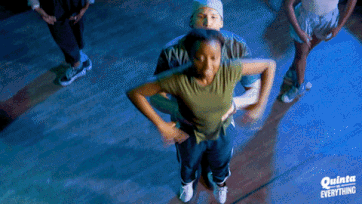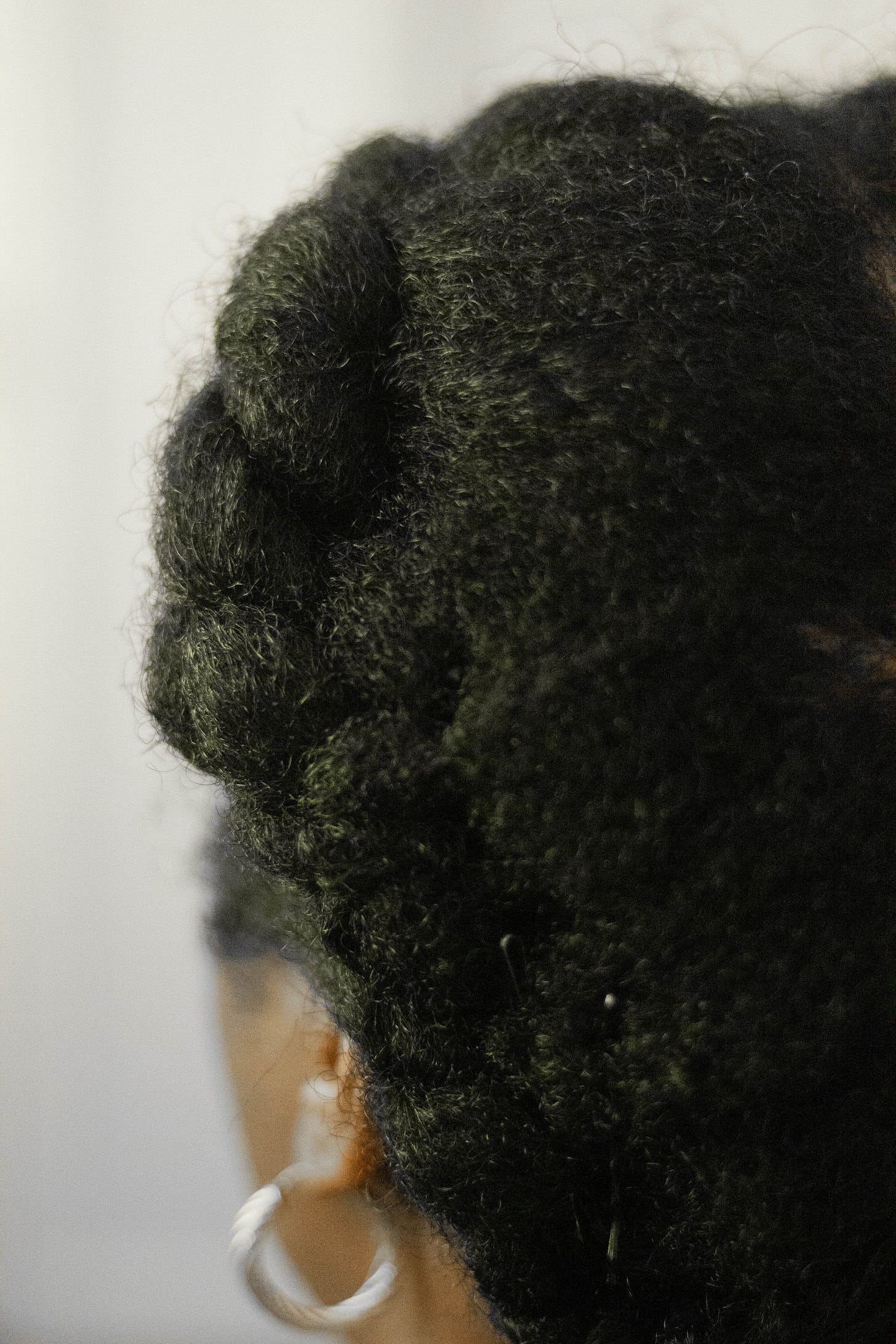Hey y’all,
Is anyone keeping up with the trainwreck that is Love Is Blind on Netflix? I’m only on episode 5 (so no spoilers please!), but I’m about ready to give up on this so-called love experiment that Netflix has been trying to make happen.
No, Nick Lachey, love is NOT truly blind.
Almost half of the cast that is getting booed up blindly through the soundproof date cube walls are clearly settling so they can be on the show. And, as Refinery29 so eloquently put it in a recently published article, can someone please get a licensed therapist on set? Particularly for Ale-, I mean Kwame, Irina, Micah, and Jackie.
At this point, I’m convinced that the divine powers that be made this show happen just so Lauren and Cameron from season one could meet. And if that’s the case, then I can be satisfied with the trainwrecks knowing that this kind of love is solely made for TV.
This Week’s Story
Have y’all noticed the uptick in commercials around relaxer settlement claims? A recent study came out that shows a link between cancer and hair relaxers, and there are now a bunch of lawsuits being filed against the hair relaxer manufacturers we’ve all grown up with.
In this week’s story, writer Modupe Oruntuba grapples with her natural hair journey and if its even worth all the trouble, as opposed to just relaxing it or chopping it off.
Enjoy!
Anayo Awuzie
EIC of Carefree
I Haven’t Enjoyed My Natural Hair “Journey.” Is That Wrong?
by Modupe Oloruntoba
Like many black women my age, I grew up getting my hair relaxed on a regular basis. It was a routine I did not question; I equated it with basic grooming. When the global conversation about natural hair reached me on social media around 2012, I slowly started following some blogs, got familiar with hair types, drank the coconut-oil Kool-Aid, and started letting my hair grow out as a self-discovery exercise. To learn to love it, I decided, I had to give my natural hair a chance. I wanted to challenge what I was comfortable with.
After chickening out of The Big Chop three times and cutting my hair in stages instead, I was finally rid of my last treated strand by 2015, and I started wearing and styling my natural hair for the first time. I’m about three years in now, and while my tight, kinky curls have grown on me, the maintenance has not. By the end of last year, after the exhausting exercise of testing styles for AFROPUNK in my bathroom, I had all but decided to relax my hair again. Combing through single-strand knots put me in a bad mood. Every week, I abandoned my sad, failed attempts to braid, twist or cover it at night. I concluded that shrinkage is a form of dark magic. It wasn’t getting easier or more comfortable, and I was frustrated, tired and checked out.
Also like many Black women my age, when I watched the original Black Panther when it premiered, and in a full cinema on opening night, we shouted and clapped when Atandwa Kani (playing young King T’Chaka) spoke his first line in Xhosa. I squealed when Babes Wodumo’s “Wololo” started playing in Shuri’s lab. I nudged my sister in the seat next to me, freaking out that the Basotho blankets we grew up with were now one-man force fields in an international blockbuster. And seeing hair like mine celebrated, normalized and immortalized in an important piece of pop culture brought me a special kind of satisfaction. I saw the movie twice and briefly considered shaving my head like Dora before trying out Nakia/Lupita’s simple braid-out from the casino scene. When I couldn’t get a simple braid-out right — again — I descended into a spiral about the decision I’d left hanging in December.
Would it be so bad to relax my hair again? I wondered. All my natural-hair milestones came to mind: that last transition haircut, my first (maybe only) successful knot-out. I hold close all the good feelings those moments brought—joy, pride, satisfaction—but they were few and far between. And they don’t stop the dread on Saturday morning when it’s time to detangle and I wish I could be anywhere but in that shower with my wide-toothed comb. The truth is, most of the time, I haven’t enjoyed “the journey.”
Maybe I set the wrong expectations, but I don’t know what else I was supposed to think. Every selfie I saw on Instagram was a fresh wash ‘n’ go, complete with an India Arie quote and the hashtag #crown. Everywhere I looked, women just like me were falling in love with their hair and with caring for it. Meanwhile, I was delaying, avoiding and half-heartedly doing the bare minimum on hair that wasn’t overwhelming in volume or length, all the while feeling guilty that I didn’t enjoy it.
It’s not a self-image issue. If you ignore the self-loathing phase of my PMS, I’m content with the way I look. When I don’t wear my hair in braids, I wear it in the same simple style: a half-twist that curls around the front from a side part, pulled into a single puff with all the rest. I’m a grooming minimalist; I really wouldn’t know what else to do with it. I find most beauty ideas exciting in theory but taxing and disappointing in reality. Real wet blanket, I know, but I can’t seem to make beauty experiments turn out the way I want them to. I miss the familiar simplicity of relaxed hair, the hair my mom taught me to take care of.
All the waffling has forced me to ask what I’m holding onto and why. The thought of continuing as I am now, apathetic and annoyed, frustrates me, but the thought of going through with relaxing feels like admitting defeat. I tell myself I’m too invested in my natural hair now, that I’ll regret hitting reset, but I know it’s not true. I tell myself I should stick with it as a quiet resistance against society’s narrow ideal, but that doesn’t feel like reason enough either. At the root of my death grip, I’ve discovered, is a sense of inadequacy that has nothing to do with the hair on my head.
As an immigrant, I often feel inadequately black. Both of my parents are from Nigeria, but we left when I was three, so I feel like a visitor there. We lived in Lesotho until I was 12 and now in South Africa, and I’m not quite at home here either. When I was a child, half of my friends were other immigrants from places like Taiwan and Sri Lanka, and I felt comfortable with them because they were as out of place as I was. Today, I never know where to place myself and my blackness, and it seems that people I interact with on the subject don’t know where to put me either.
It was only while reflecting on one such awkward coffee shop conversation that I made a connection: All of these hanging questions about how I see myself and how I am perceived by others have become the stressful background noise of my daily life, and in an effort to find an outlet, I’m projecting. My frustration with my hair, a piece of my identity I can see and touch, is really a frustration with the chaotic puzzle of all the pieces I can’t.
Watching Black Panther made me feel the same way going to AFROPUNK did. I could relax because I didn’t have to find a place to fit in and prove that I belonged. My blackness, undefined as it is, was not questioned. Finding my way to a contented sense of self-awareness probably won’t be cut and dry, but maybe when I stop wrestling with defining, placing and validating my blackness, I’ll stop wrestling my hair.
Enjoyed this week's storyletter? Tap the heart & share it! 😍
Share on Twitter | Share on Facebook | Share via email | View past stories
Originally published on Man Repeller







"I find most beauty ideas exciting in theory but taxing and disappointing in reality."
Good article. I concur.